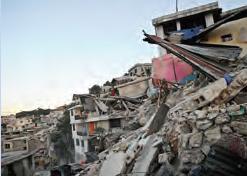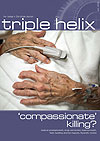 It's so unfair. My children live in a comfortable house, eat three meals a day and have a friendly GP down the road – though they rarely need him. Today, thousands of children in Haiti are living in shelters made of cardboard and cloth, eat once a day if they are lucky, have no access to healthcare, and are dying from preventable diseases. The earthquake which hit Haiti in January killed 230,000, injured 300,000 and left 1,200,000 homeless.
It's so unfair. My children live in a comfortable house, eat three meals a day and have a friendly GP down the road – though they rarely need him. Today, thousands of children in Haiti are living in shelters made of cardboard and cloth, eat once a day if they are lucky, have no access to healthcare, and are dying from preventable diseases. The earthquake which hit Haiti in January killed 230,000, injured 300,000 and left 1,200,000 homeless.
Why did a devastating earthquake happen in a country already ravaged by poverty, instability, dictatorships and environmental degradation?
Why did God allow it?
Why?
Throughout the ages man has wrestled with the problem of suffering – the only answer Job got to his questions was that God is beyond our understanding. 1We may never get a full answer to 'Why?' this side of eternity. However, we do know that man's sin did not only spoil his relationship with God, but brought disharmony and decay to creation as well. 2We also know that much human suffering and poverty are the result of man's greed and failure to care for the vulnerable. In Haiti, 1% of the population own half the country's wealth. (3) The high-density, badly-constructed housing in which the disadvantaged were living and the poor infrastructure which made assistance so difficult were some of the reasons why the earthquake caused such massive loss of life. (4)
However, if we ask a different question, 'Does God care?' we do find an answer – in a manger and on a cross. God did not stand aloof, watching a broken world groaning under the effects of man's sin. 2 He came into the world as one of us and by his suffering and death has broken the power of the Fall and begun the process of redeeming and restoring creation. We hang on to the fact that one day 'there will be no more death or mourning or crying or pain'. (5)
But what of now? Where is God while we wait for that day? Where is God in the chaos and tragedy in Haiti? I believe he is right there, in his people – the body of Christ. He is in the local church and in the Christians who have gone to help.
-
Haiti facts and figures
- Poorest country in the Western hemisphere
- 70% Haitians live on less than a dollar a day
- 60% have no access to healthcare
- 1 in 6 children die before their fifth birthday
- 230,000 people have died in the earthquake
- 300,000 were injured
- 1,200,000 are left homeless
Chris Lewis' story
CMF member Chris Lewis is the Emergency Health Advisor for Save the Children Fund UK. I interviewed him in Haiti – by email – to find out what is happening there and what he is doing to help.
Chris - what are you doing in Haiti?
I am here to establish Save the Children's emergency response health programme for Haiti, and then hand it over to other members of the team to continue. We have had over 50 international staff and many more national staff working as part of the emergency response in a number of sectors including health, nutrition, sanitation, education, shelter, protection and food security. Within the health sector, following the initial focus on trauma after the earthquake, the Ministry of Health and the World Health Organisation (WHO) are now prioritising primary health care.
Most people are living in makeshift camps with no health facilities, so Save the Children is running 20 mobile health teams who are providing essential services in 40 camps, seeing over 3,000 patients a day. The most frequent problems are acute respiratory infection, diarrhoea and malaria – the three main causes of under-5 mortality globally. Other activities include immunisations and management of acute malnutrition. As time progresses the interventions will become more comprehensive and integrate reproductive health, community case management and HIV activities.
What does your average day look like?
The day begins with organising the health teams, making sure they have enough medicines, food, vehicles, tables, chairs, etc for the day and getting them to the appropriate camps to set up mobile clinics. After this 'detail' work, I will spend the middle of the day juggling the 'big picture' work: planning strategies with Save the Children/WHO/Ministry of Health, working on recruitment, supplies, budgets and proposals. At 3 o'clock it's time to find an available vehicle, battle through the Port-au-Prince traffic for an hour, and join the mêlée in the health coordination meetings at the UN base, when representatives of the numerous aid agencies meet to plan how to work together effectively.
Coordination has been one of the challenges of this earthquake response, with the large number of short-term small organisations arriving into Haiti, including many without experience of working in this context. There are 360 different agencies registered with the health sector! Coordination and planning are incredibly difficult when individuals are not used to working in emergencies, and when some organisations come in for three weeks and leave without handing over activities.
When the UN meeting is over, I drive back to the office as the sun goes down and the curfew begins. I get back to my desk to try and get on top of everything before the end of the day, finishing work hopefully before midnight.
How did you first get involved in this kind of work?
I got the 'bug' when I was travelling around East Africa in 1996 and spent some time in the Rwandan refugee camps. As students my wife Karinya and I felt called to work in this area, but wanted to finish our junior doctor training before working overseas.
After a couple of years as a GP, I studied the Diploma in Tropical Medicine, Karinya studied a Master's in Community Eye Health – and we set off. We worked in Southern Sudan for three years, initially with Medair. We lived 'in the bush' in a small tent in Jonglei, supervising primary health care, a TB programme and being part of the team responding to disease outbreaks – cholera, meningitis, hepatitis E, etc. We then moved to Juba, where Karinya worked for CBM as an ophthalmologist and I worked as Health Coordinator first for Tearfund, and then for WHO/Ministry of Health. We came back last year to start a family – our son is now five months old – and I began work with Save the Children.
People often ask me how they can get into humanitarian work. When the job description often reads 'Two years of humanitarian experience is required for this role' how can you get experience when you can't get the initial job? If you are interested in this line of work, do some travelling and volunteering in developing countries to be sure that this is the environment that you want to work in. Some organisations such as Medair will take people without humanitarian work experience as volunteers for the first year, following a selection process. The Diploma in Tropical Medicine or a Master's in Public Health are useful qualifications.
Out there in the midst of the devastation, do you ever ask why God allows these things to happen?
The impact of this tragedy is enormous – one in every fifteen people that were in the earthquake died. Everyone has lost someone. When I think of the effect on the individuals in Haiti, it is impossible not to feel the emotion and sense of injustice. When we wrestle with the question 'Why does God allow suffering?' we can read books, look at the background, and come up with theological reasoning which, though still difficult, makes sense. However, it is much more difficult when confronted head on with the reality of a 'natural' disaster. While driving through the wreckage and hearing the individual stories of tragedy, I have struggled with this reality. In this acute period, I have had to put it to one side for the moment in order to do my job. When I get home and when I am ready, I will pray, reopen the books and the discussions, and I am sure that the question 'Why does God allow suffering?' will be a lot more real and difficult. Despite this, it is inspiring to see the faith of the Haitian people as I hear worship songs drifting across the ruins.
Conclusion
Where is God in our broken world? He is in his people. He is in those who continue to praise him in the midst of suffering, he is in those who pray, those who give and those who go. We can each play a part, as members of the body of Christ.
































